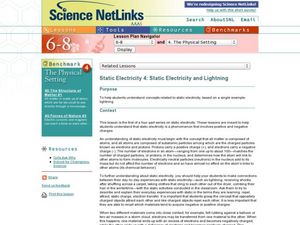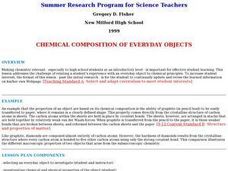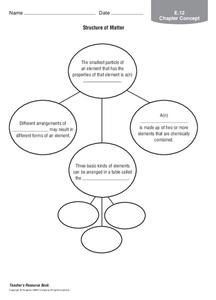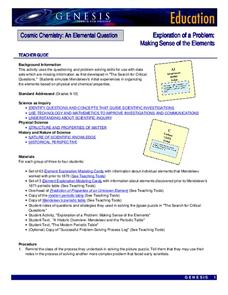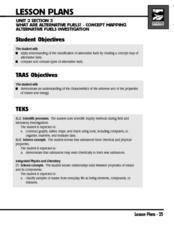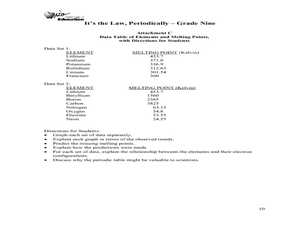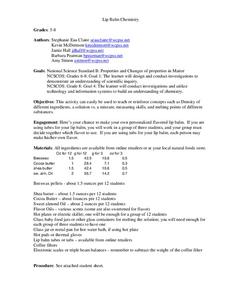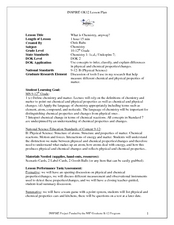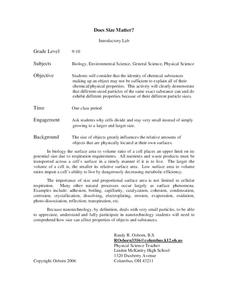Curated OER
Amazing Water Changes
Learners explore the properties of water and how it changes states. In this kindergarten to 2nd grade science lesson plan, students pair a hands-on science activity with two suggested books. This inquiry lesson plan...
Curated OER
Anatomy of an Element
Learners discuss matter and atoms using this resource. First, they look at a website describing atoms. Then, they learn about the periodic table and discuss how it is organized. Finally, they create a comic strip to display their...
American Chemical Society
Colors Collide or Combine?
As part of a unit investigating the dissolving of M&Ms® candy coating, this lesson examines whether or not the different colors combine. There are no new concepts revealed in this particular lesson, but learners will see that the...
Curated OER
Chemical Composition of Everyday Objects
High schoolers relate chemistry to an object they use everyday. They research information related to chemistry and create their own webpage. They are to keep their page up to date as new observations are taken.
Curated OER
Matter and Chemical Bonding
In this chemical bonding worksheet, learners read about the invisible killer, dihydrogen monoxide. Students read about the products it is used in and the problems it causes to the environment. Then learners complete 19 short answer...
Curated OER
Chemical Formulas Unit-Day 4
The purpose of this lesson involves reviewing nomenclature and molecular
formulas as well as introducing naming molecular compounds and identifying acids. The students investigate and understand how conservation of energy
and matter is...
Curated OER
Chemistry Practice
In this chemistry practice worksheet, students select the correct response to the given questions. Students apply knowledge about the states of matter, finding vapor pressure and atmospheric pressure.
Curated OER
Structure of Matter
In this matter worksheet, students review the structure of matter including elements, atoms, and the periodic table. This worksheet is a graphic organizer.
Curated OER
Temperature and Enzymes
Young scholars compare the times it takes the milk in each of two cups to curdle. They are told that an enzyme that is added to the milk, rennin, is involved in the natural curdling process of milk. Students are asked to consider what...
NASA
Exploration of a Problem: Making Sense of the Elements
When given too much data to simply memorize, it helps to sort it into manageable groups. The second lesson in the six-part series of Cosmic Chemistry challenges groups of pupils to take a large amount of data and figure out how to best...
NASA
Melting Ice: Designing an Experiment
Sometimes, despite the best laid plans, the unexpected will occur. Learners witness this firsthand as they carefully design an experiment to determine the time needed for ice to melt in salt water or pure water. They uncover facts not...
Agency for Toxic Substances and Disease Registry
Don't Mess with Mercury (Lesson A)
Mercury is the only metal that is a liquid at room temperature. Teach your class this and many more interesting mercury facts by assigning an engaging task. A public relations activity, the exercise informs pupils of the hazards of...
Curated OER
Ice Cream
Open this instructional activity by giving a brief history of ice cream. Using liquid nitrogen to lower the temperature, preteens make their own confection. The accompanying activity sheet queries learners about freezing point, the...
Curated OER
Unknown Element Project
Pupils work with a partner to determine the identity of an unknown element based on given descriptions. Groups use classroom textbooks, encyclopedias, and science internet sites to identify their unknown element then write a report as...
Curated OER
What Are Alternative Fuels? Concept Mapping Alternative Fuels Investigation
Students compare and contrast the different types of alternative fuels. They create a concept map to understand their classification. They examine the properties of matter and energy as well.
Curated OER
It's the Law: Periodically
Ninth graders examine the Periodic Table. In this element lesson, 9th graders observe the chemical reactivity of elements. They graph the properties and discuss the trend in the group and period of elements. The students use math to...
Curated OER
Funny Putty
Students are introduced to the properties of solids, liquids and gases. They see that colloids are mixtures which display the properties of more than one of these states. They engage in an excellent experiment which demonstrates this fact.
Curated OER
pH and Red Cabbage Juice
Students review properties of materials and define what pH tells them about matter. In this pH levels instructional activity, students determine whether materials are acids or bases using indicator substances.
Curated OER
SAFETY KNOWLEDGE BASE CHANGES
Students research and formulate a hypothesis for research to correlate changing safety regulations in regards to personal and environmental safety polices for storage, handling and disposal of chemicals, risk involved in hazardous...
Curated OER
Lip Balm Chemistry
Students explore density, mixture and solutions in a reaction. In this chemistry lesson, students create their own chap-stick using ingredients they analyze for their chemical contents. They discuss measuring skills, melting points and...
Curated OER
What Is Chemistry, Anyway?
Students differentiate physical and chemical change. In this chemistry lesson, students list examples of those changes. They apply what they learned in a Jeopardy style team game.
Curated OER
Does Size Matter?
Learners explore the surface area to volume ratio in cellular respiration. While participating in an interactive lab experiment, they examine proportional surface area and discuss nanotechnology. Students observe the effectiveness of...
Virginia Department of Education
Soap, Slime, and Creative Chromatography
Do you think chromatography paper suffers from separation anxiety? Young chemists make soap, slime, silly putty, and experiment with chromatography in this lesson. The material includes clear instructions for each experiment along with...
Cornell University
Atomic Bonding
Explore the connection of surface area to bonding within atoms. Learners complete lab investigations to model changing surface area with different sizes and concentrations of atoms. A flour fireball demonstration follows the labs to...


